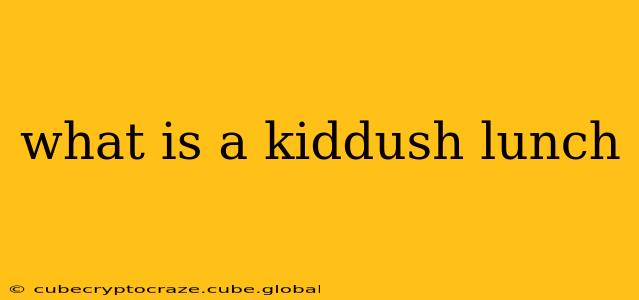A Kiddush lunch is a celebratory meal held by Jewish people following the Kiddush, a blessing over wine recited to sanctify the Sabbath (Shabbat) or a Jewish holiday. It's a joyous gathering centered around food, family, and fellowship, marking the beginning of a special time of rest and reflection. While the Kiddush itself is a short ceremony, the lunch that follows can be a significant and lengthy affair, varying greatly in formality and style depending on the family and community.
What Happens at a Kiddush Lunch?
The core of a Kiddush lunch is the shared meal following the recitation of the Kiddush. This isn't just a casual lunch; it's a deliberate gathering with a specific purpose – to celebrate the holiness of Shabbat or a Jewish holiday. The atmosphere is typically warm, convivial, and relaxed.
Here's a breakdown of what you might expect:
-
The Kiddush: The meal begins with the Kiddush, recited by a designated person, often the head of the household or a religious leader if it’s a larger gathering. This blessing sanctifies the wine and marks the transition into Shabbat or the holiday.
-
The Meal Itself: The food served is often traditional and celebratory, often including challah bread, various savory dishes (think cholent, gefilte fish, or roasted chicken), and delicious side dishes. Dessert is also a common feature, often featuring sweet treats like babka or rugelach. The exact menu is highly variable, depending on the occasion, family traditions, and dietary restrictions.
-
Conversation and Fellowship: A key element of the Kiddush lunch is the opportunity for socializing and strengthening community bonds. It's a time for family and friends to connect, share stories, and enjoy each other's company in a relaxed and meaningful setting.
-
Different Settings: Kiddush lunches can take many forms. Some families hold intimate gatherings at home, while others may attend larger community Kiddush lunches at synagogues or community centers. The scale can range from a small family gathering to a large-scale event with dozens of attendees.
What Makes a Kiddush Lunch Different from a Regular Meal?
The distinction lies primarily in the intention and context. While a regular lunch is simply a meal, a Kiddush lunch is a ritualistic and celebratory meal explicitly marking the start of Shabbat or a holiday. This intention elevates the meal beyond its purely nutritional purpose, making it a significant part of the religious observance. The Kiddush blessing itself imbues the event with a sense of holiness and sacredness.
What are the Traditional Foods Served at a Kiddush Lunch?
There's no single, universally prescribed menu for a Kiddush lunch. However, certain foods are frequently featured, owing to their cultural significance and association with Shabbat and Jewish holidays:
- Challah: A braided egg bread, often considered the centerpiece of the Shabbat meal.
- Gefilte Fish: A poached fish dish, traditionally served cold.
- Cholent: A slow-cooked stew, often including beans, meat, and barley, perfect for Shabbat as it requires minimal preparation on the Sabbath.
- Roasted Chicken or other meats: Depending on tradition and preference, various meat dishes might be served.
- Salads and Side Dishes: A variety of vegetables and side dishes complement the main course.
- Desserts: Sweet treats like babka, rugelach, or other pastries are often served to conclude the meal.
How is a Kiddush Lunch Different from a Seudah?
While both involve a festive meal, there's a subtle difference. A seudah is a more general term referring to any festive Jewish meal, encompassing Shabbat meals, holiday meals, and other celebratory gatherings. A Kiddush lunch, in contrast, is specifically a meal that follows the Kiddush ceremony and is directly associated with sanctifying the Sabbath or a holiday. Essentially, a Kiddush lunch is a type of seudah.
Understanding the significance of a Kiddush lunch gives you a deeper appreciation of the rich cultural and religious traditions within the Jewish faith. It’s more than just a meal; it’s a celebration of community, family, and the holiness of Shabbat or a Jewish holiday.
